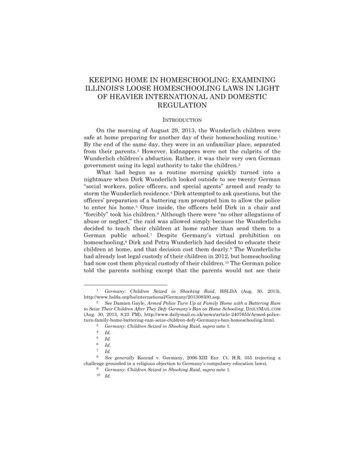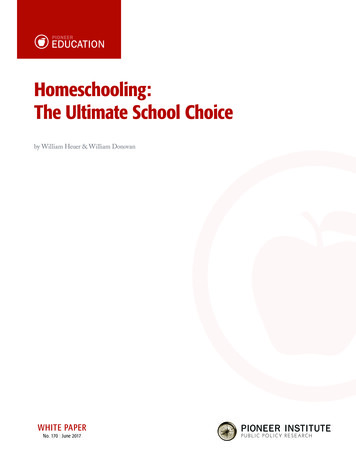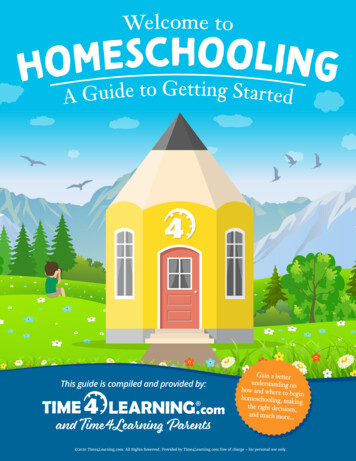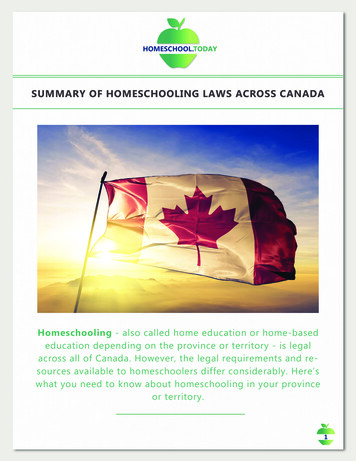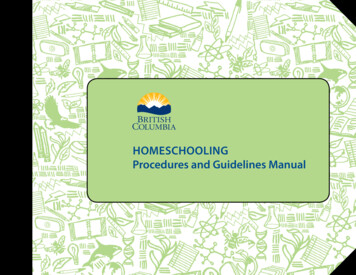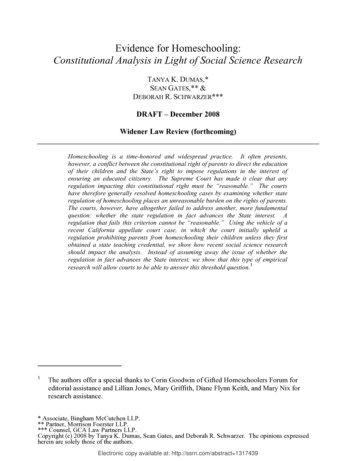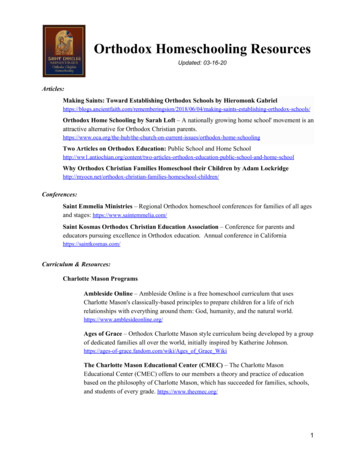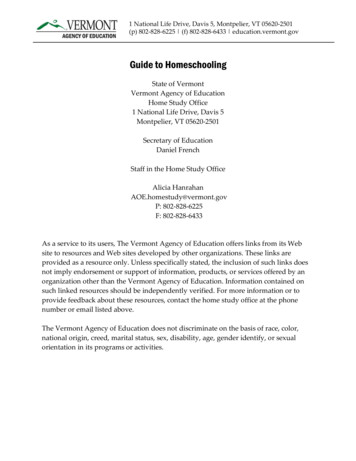
Transcription
Scholarly Journal of Education Vol. 3(1), pp. 1-9, February 2014Available online at http:// www.scholarly-journals.com/SJEISSN 2315-6155 2014 Scholarly-JournalsReviewWhat we know about homeschooling: a critical reviewof literature and studies on homeschoolingYzobelle Mangahas LeonUniversity of Santo Tomas, Graduate School, Manila, Philippines Multiple Intelligence International School,Quezon City, Philippines. Email: yzo.leon@gmail.comAccepted 12 November, 2013The number of parents who choose to completely take over the education of their children by giving it athome and away from state-run schools and state-accredited private schools is undeniably increasingboth in the global and local context. This article provides an organized body of knowledge by puttingtogether significant literature and studies made over the past decade. This critical review wasstructured in a manner of presenting important issues that are inherent in homeschooling as aneducational phenomenon. The thematic analysis of literature and studies that this article made availablepresents the issues as in a spectrum of debate, providing the varying points of view of educationalresearchers. Among the themes discussed are the following: motives leading to homeschooling;scholastic development of homeschooled children; social and personality development ofhomeschooled children; impact of homeschooling choice on the family; the struggle for custody overchildren’s education; state recognition and legalization; homeschooling, community life and thepurpose of public schooling; and homeschooling from the perspective of the main stakeholder.Key words: Education, homeschooling, critical review, Philippines.INTRODUCTIONIn the global context, the increase in number of parentswho choose to completely take over the education of theirchildren by giving it at home and away from state-runschools and state-accredited private schools isundeniably exponential. There is hardly any literature onhomeschooling that does not mention the rapid growth ofthis educational phenomenon and has therefore capturedthe attention of the academic community and educationalresearchers, especially education policy-makers (Hill,2000; Kunzman, 2009), sociologists (Crowson, 2000;),and even individual parents (Hiatt-Michael, 2008) sincehomeschooling is indeed a “development of significance”(Crowson, 2000, p.296).After reading through voluminous literature and studieson the homeschooling phenomenon, it has come to myattention and interest as a researcher of how muchhomeschooling has brought a great stir in internationalacademic communities not simply because of itsskyrocketing increase in population but because of all itsaccompanying issues that matter.This critical review of literature and study utilizes athematic approach, using the relevant issues thatemerged as the main themes for discussion. Someissues are presented from the perspectives given fromthe opposite ends of the spectrum of accounts; the othersshall provide the discourse that the literature disclosed.These themes provide the readers and researchers anorganized discussion on homeschooling, which is a muchdebated on educational phenomenon but remains tohave unresolved key issues.The themes that emerged from this critical review arethe following: motives leading to homeschooling;scholastic development of homeschooled children; socialand personality development of homeschooled children;impact of homeschooling choice on the family; thestruggle for custody over children’s education; staterecognition and legalization; homeschooling, communitylife and the purpose of public schooling; andhomeschooling from the perspective of the mainstakeholder.Motives Leading to HomeschoolingAnyone who encounters the homeschooling phenomenonfor the first time, whether as an educator, a parent, a
Scholarly J. Educ.public officer, or simply an “onlooker” from outside theeducation field, the query that he would naturally want tosatisfy first is the issue of motives. Why do parentschoose to homeschool their children when from the veryonset doing so can actually bring more complexities intotheir life? What motives can be so strong that parentswould actually want to forego the state-funded educationof their children? Or the private education that they havefinancially prepared for? Many researchers have dweltinto the study on what motivated some parents tocompletely take the education of their children into theirhands and away from public education.The upsurge of the number of parents who choose tohomeschool led researchers to probe into this issue asearly as the 1980s. The often-cited framework forclassifying parents’ motivations is that of Van Galen(1988) where two main categories surfaced: theideologues and the pedagogues. The former groupconsists of those parents whose main motive forhomeschooling is to teach their children a specific set ofvalues, other than that which is taught in school or whichthey believe is non-existent from schools’ formalinstruction. Some parents may have strong religiousmotives for taking over their children’s education. That isan example of an ideologue motive. The latter group ofparents in Van Galen’s framework refers to those parentswho believe that the pedagogy used in traditional schoolsis contrary to the way children learn best. Unpleasantexperiences in traditional schools or deep rifts with schoolauthorities led some parents to pull their children out ofschool and give refuge in their homes. That is anexample of a pedagogue motive. According to Nemer(2002), this typology presented by Van Galen (1988) isthe most useful for researchers as a springboard tofurther inquire into the motives.In fact, Nemer (2002) used the ideologue-pedagogueclassification as basis for an expanded framework ofmotives. For Nemer (2002), some parents actually fall inbetween the two preceding categories and that parentalmotives are actually multi-dimensional. The study ofNemer (2002) presents a broader range of motives andexpanded the ideological and pedagogical motivationsinto four quadrants of classifications of homeschoolers,encompassing the high and low levels of both ideologicalmotivations and pedagogical motivations.A later study expanded these parental motives evenmore. Hannah (2011) conducted a longitudinal studywhere secondary motivations emerged. She furtheridentified strong motives such as assisting some specialneeds of a child, attending to medical concerns of thechildren; and addressing safety and security issues. Thislast identified motive was affirmed and developed byMazama and Lundy (2012) who put safety and securityissues in the context of the African American parentswhose strong motive for homeschooling is racialprotectionism. Objecting to the notion that African2American parents’ motivations can be subsumed to“White motives” (p. 742), researchers Mazama andLundy (2012) did their own inquiry and found out that thespecific cohort of their study strongly sees the need ofprotecting their children from school racism since theybelieve that it is a factor that can deeply interfere anddestruct children’s academic development, sense ofworth and self-confidence.Other researchers inquired into the same issue ofparents’ motivations but diverted from the giventypologies and instead came out with their own listing ofmotives. Brabant, Bourdon, and Jutras (2003) forinstance named four main reasons why some families inCanada choose to homeschool. These four include thefollowing: a) the intent to pursue an educational projectas a family; b) a strong objection to the organizationalstructure of the school system; c) the desire to offer anenhanced curriculum; and d) a deep concern for thechildren’s socio-affective development. Homeschoolingparents believe that keeping their children at home is thebest means to avoid a school environment that theyperceive to be too violent and a strong agent forunnecessary peer dependency and pressure. Strong andactive involvement in their children’s education is whatsome families believe would assure the quality ofeducation for their children.Similarly, Green and Hoover-Dempsey (2007)recognized that the three strongest motives thathomeschooling parents have fall under the compulsionfor involvement in the educational process. Parentsbelieve that they should play an active role in theirchildren’s education because they have the ability to helptheir children succeed in academic learning and that theirfamily context is the greatest factor that makeshomeschooling possible. Green and Hoover-Dempsey(2007) describe the homeschooling mothers as “apopulation that is clearly involved in their children’seducation but in a very nonstandard way” (p. 281).Aside from the American educational system,researchers within the English educational system hadalso done their share of inquiry into the motives ofparents for going into homeschooling. Rothermel’s study(2003) was set in the UK where the homeschoolingmovement is not as out in the open as it is in countriesusing the American educational system. Nevertheless,Rothermel (2003) gives a good synthesis of the varioustaxonomies of home education that different researchershave concluded in their own studies. He cites Blacker’s(1981) three categories of parents being the competitors,the compensators, and the rebels; Mayberry’s (1989) fourcategories being the religious, the academicallymotivated, the social-relational, and the new age groupsof parents; and Stevens’ (2001) translation of theideologue-pedagogue typology into earth-based andheaven-based parents, respectively. This two-prongclassification of Steven’s is also the basis of Apostoleris’
Leon3(2002) classifications of the ideologues or the earthbased parents as those dissatisfied with content on onehand and the pedagogues or the heaven-based parentsas those dissatisfied with method, on the other hand.After giving a thorough review of different studies doneon this single issue of motivations and after conducting aset of interviews with British families, Rothermel (2003)came up with the Rothermel Classification: The StratumApproach. The stratum approach is a way of classifyingparents not solely on motives but on the levels ofsameness among the families. Hence, four levelsemerged. Rothermel (2003) identified that the first level offamilies is the superficially homogenous group where theonly thing common among them is the fact that they allhomeschool. The second level of families is the groupdifferences wherein homeschooling families have naturalantipathies among themselves because of the differentreligious groups they belong to. Families in this levelconsider unity in belief as an important matter. The thirdlevel of homeschooling families are those with inter-familydifferences, which refer to the differences among thefamilies within the same religious group. Amongthemselves, friction can arise as to who is really homeeducating in the truest sense. The highest level of thestrata is reserved for the intra-family differences wherefactions spring from having different views within theimmediate and extended family with regard to homeeducating. Rothermel’s (2003) study reveals that ithappens that one parent does not agree with the otherparent’s desire for home education or that grandparentscriticize parents’ decision to pull out from the publiceducation.The interesting message that Rothermel (2003) wantsto highlight with this rather unique stratum approach isthat the previous taxonomies and typologies of classifyingmotives can be narrow and limiting. The significance ofthe Rothermel Classification is to drive home the pointthat homeschooling motives and experience can be asvaried as the number of families who are actuallypracticing it. The four levels of differences within andamong the homeschooling families are a manifestation ofthat variety of cases of homeschooling experience andthus, anyone who wants to study this phenomenon wouldhave to be faced with varied cases that can have moredifferences than similarities among each other.Scholastic Development of Homeschooled ChildrenAcademic development of homeschooled childrenunsurprisingly belongs to the top of the list of concernsthat educators and parents are interested in. After all, thedevelopment of knowledge and academic skills are at thevery core of the teaching and learning process(Breitborde and Swiniarski, 2006).A number of researchers have attempted to measurethe effectiveness of homeschooling using the scholasticdevelopment of the homeschooled children as themeasure stick. Hill (2000) revealed that his studyconcluded that students who have been home schooledtheir entire academic life prior to tertiary education havehigher scholastic achievement test scores compared withthose who have also attended other educationalprograms in regular academic institutions. However, Hill(2000) frankly discloses the inherent impediment of hisstudy, which is the absence of an accurate number of thehomeschooling population. Furthermore, Hill (2000)admits that “it is still impossible to say whether, on thewhole and on average; homeschooling students aredoing much better than their public and private schoolcounterparts” (p. 27). Hence, scholastic development ofhomeschooled children must be appreciated not from anorm-reference perspective where a group’s performanceis seen in the light of another group’s performance.Rather, attempts to study the academic development ofhomeschooled students must be approached with acriterion-reference perspective.The difficulty that Hill (2000) expressed was affirmed bythe later study of Collom (2005) who claims that studyingthe academic achievement of home education students iseven more difficult than studying parental motivations forthe simple reason that not all homeschooled studentstake standardized achievement tests, which are thecommon basis for the scholastic measurement. Collom(2005) further says that those who take standardizedachievement tests may not represent the homeschoolersas a whole. Recognizing this limitation in studying studentacademic performance, Collom(2005) avoidedcomparing test scores between homeschooled studentsand traditionally schooled students but instead identifiedthat the two main contributing factors of studentachievement are actually parent-related. Students whoare homeschooled by more educated parents havehigher levels of academic achievement and students whoare homeschooled by more conservative parents performbetter on standardized tests. The explanation of Collom(2005) with regard to “conservative” parents is quiterevealing of an important matter to take note of.Conservative homeschooling parents are those whomore likely teach their children at home in a way that theclassroom environment is replicated. Collom (2005)further discussed the conservative characteristicjuxtaposed to the liberal parents who tend more towardspracticing informal and experimental teaching at home.Other researchers have also attempted to compare theacademic achievement of homeschooling children withthat of children in formal schools. Duggan (2009) andRothermel (2004) both claim that homeschoolingstudents perform at one or two grade levels above theirpublic-schooled and private-schooled peers. Aside fromthis claim, another common declaration put forward byboth researchers is that their findings are tentative
Scholarly J. Educ.4because of the significantly small response rate they gotfrom the homeschooling population.Romanowski (2001) avoided the attempt to makecomparisons but rather developed a discourse on howlack of peer classroom interaction can be detrimental to achild’s education. As an educational scholar himself,Romanowski (2001) asserts that students need toengage in discussions, share their ideas, and evencompete with their peers. A classroom setup givesstudents this opportunity of significant interaction asidefrom the opportunity to compare and contrast themselveswith their peers in a variety of areas. He also expressesthe concern about the scope and depth of knowledge thatis required in some content areas as the homeschooledchildren move into secondary level. Romanowski (2001)further reveals some degree of wariness on the properassessment and diagnosis of problem areas, which arecrucial components in broadening and deepening thequality of academic learning.children’s exposure from the diversity of beliefs andbackgrounds that can be encountered in formal schools.On the other end of the spectrum on the issue ofsocialization and personality development is Parker(2012) who contends that the homeschooling experiencehad instilled a high level of self-esteem in the studentswhom she followed closely through a case study. Sheobserved them to be assertive and have a welldeveloped personality that enables them to be quicklearners and excellent in goal setting. This positioncoincides with the other perspective that Romanowski(2001) highlighted. He supports the argument thatbecause homeschooled children spend most of their timearound their parents in an accepting atmosphere, theyare able to engage socially in multi-age situations with ahigh level of confidence. While this may be an advantagefrom one angle, Breitborde and Swiniarski (2006) assertfirmly the significant role of peer interaction for a richerand deeper learning experience.SocialandPersonalityHomeschooled ChildrenImpact of Homeschooling Choice on the FamilyDevelopmentofWilhelm and Firmin (2009) and Beck (2001) recognizethat adequate and appropriate socialization of childrencontinue to top the list of significant challenges that existfor the home education movement. Duggan (2009)reveals an empirical data of how much social experiencehomeschoolers have compared with the other formallyschooled children. Of his respondents, Duggan (2009)claims that 32% of the group of public-schooled studentsspent 16 hours per week socializing with friends,compared with 22.2% from the group of private-schooledstudents, and 18.2% from the group of homeschooledstudents. This data supports what an earlier researchclaimed. Beck (2001) states that teachers and educationpolicy makers often express the opinion thathomeschooling dissocialize children that they often endup with “distorted ideas of the norms of society” (p. 359).The main factor that contributes to this distortion of ideasis the fact that homeschooled children have contact onlywith the family or within a small-scale of society.Romanowski (2001) concurs with Beck’s (2001) claimsaying that the usual outside activities of homeschooledstudents involve going on field trips, boot camps, andmuseum visits with a select group of people who sharethe same values, background, and social class.Romanowski (2001) builds up his position on the dangerof this small-scale society citing that such a controlledgroup does not represent the reality of life, neither incollege nor in the work life. “Unless these children areexposed on a daily basis to the social life found in publicschools, they will lack the skills needed to successfullyadapt to real life situations when they get older”(Romanowski, 2001, p. 81). Homeschool interactions limitThe education of children remains to be a family concern.The parents oftentimes make educational decisions andtheir choices leave traces of impact on the entire family.The decision to completely home educate one’s childrencan be a daunting one (Sheehan, 2010) and the journeyin sustaining the decision is a completely family affair(Kambayashi, 2002). For this reason, Brabant et al.(2003) assert that the parents’ motivations that led to thedecision to homeschool must be strong enough to beaccepted by themselves and all the other members of thefamily who must be willing to accept the lifestyle changethat consequently comes with the decision. Brabant et al.(2003) further emphasize that parents have to acceptboth the “hazards of marginalization” (p. 114) and thelinked possibility that their children could develop a senseof exclusion from the mainstream majority who are beingeducated in formal schools.True enough, Lois (2009) reveals that somehomeschooling mothers are accused of maternaldeviance for keeping their children out of conventionalschools. They receive powerful allegations from eventheir closest friends and family members that they areirresponsible mothers who “ruin their children bydepriving them of the opportunity for normaldevelopment” (Lois, 2009, p. 224).An earlier study cautions parents on the manner inwhich the decision to homeschool is reached. McDowell’sadvice (2000) is grounded on his in-depth conversationswith homeschool mother-teachers who reveal that howparents reached the decision to homeschool greatlyinfluences the overall positive or negative feel of thehomeschooling process. McDowell (2000) shares thelessons learned from his case study and the greatest of
Leon5which is that the “undercurrent of anger” (p. 198),springing from feeling forced into the decision, does existin some mother-teachers and the anger permeates thehomeschooling process and therefore affects the parentchild relationship in a detrimental way.Homeschooling brings about inherent challenges thatcan significantly affect the individual family members andeven in the level of the entire family as a social institution.According to Rothermel (2004), raising a family on theequivalent of one income can be a burden to some, if notmost, families. In the same light, Romanowski (2001)claims that home schools are no different from publicschools with regard to resources, funding, and facilities.Both Rothermel (2004) and Romanowski (2001) supportfirmly their position that family income affects the overalleducational experience and hence, limited resourcesaffect the families’ capability to provide adequateeducational opportunities. Home education can thereforebecome limiting and selective in favor of the affluentfamilies, or the well-to-do families at the least.Romanowski (2001) highlights that “wealthier families canoften provide a better overall home school education” (p.82) since the experience can prove to be a financialburden for poorer families. Davies and Aurini (2003) carrythe same sentiment asserting that even with thenewfound legitimacy that homeschooling families enjoy inCanada, there is a “natural cap” (p. 71) on thehomeschooling population as it is limited to families whocan afford the time and the gone income of at least oneparent.Aside from the financial challenges that homeschoolingfamilies face, another major concern that parents,especially mothers, have to confront is the feeling ofpersonal shortcomings as a teacher and balancing all theworkload of being both the teacher and the homemanager at the same time (McDowell, 2000; Lois, 2010).This tension between roles results to another stressfulpredicament. The in-depth interviews that Lois (2010)conducted with homeschooling mothers reveal that theintensive demands of their double roles in the familyleave them stressed and dissatisfied with the amount oftime they had to pursue their own interests. The group ofmothers in the study share their feelings that althoughthey are happy to live up to the “ideals of good motheringby developing a great deal of time to our children, wealso wish for ‘me-time’” (Lois, 2010, p. 428).On the other end of the spectrum on this issue, someresearchers have managed to bring out the moreencouraging effects of the homeschooling decision on thelife of the entire family. McDowell (2000) refers to theseas the jewels of homeschooling. The most treasuredones are the flexibility it brings to various aspects ofschooling and family life, children being able to teachthemselves, and the peace of mind that homeschoolinggives to the parents, relieving them of the worry aboutwhat might happen physically and emotionally to theirchildren in school. Rothermel also mentions that althoughparents experience the financial load that homeschoolingbrings, they value more the freedom to live according totheir own ideals and “relished the flexibility to ‘do what wewant’ and ‘when we want’” (2004, p. 296).From another perspective level, Hill (2000) considershomeschooling to be a large teacher-training programwhere thousands of people are learning how to teach. Hill(2000) also sees it as an opportunity for parenteducation, declaring that “homeschooling must be one ofthe biggest parent training programs in the country” (p.22).The Struggle for Custody over Children’s EducationThe question on whose custody does children’seducation really belongs had been the cause ofdisagreement between the homeschooling advocatesand the promoters of public education. On one end,Meisels (2004) claims that parents’ decision tohomeschool sits within the boundaries of their parentalrights to choose. On the other end, Blokhuis (2010)classifies this claim of parental right as outside thecontext and a deliberate disregard for the parens patriaedoctrine. Lubienski (2003) has also recognized this pullfrom either poles saying that while claims about parentalright and duties may be valid up to a certain extent, theyneglect the public’s legitimate interest in the process ofeducation. According to Nemer (2002), parents whochoose to homeschool their children actually viewthemselves to be diverging from the mainstream society,yet their belief of the extent of their rights and duties overthe education of their children gives them the justificationto accept the label of being divergent.According to Meisels (2004), parental authorityencompasses the right to make life choices for one’schildren and laws on compulsory attendance to publiceducation are an outright intrusion of the parentalboundaries. Meisels (2004) further justifies his adamantclaim that major educational decisions belong primarily toparental rights and duties by saying that children are theproperty of their parents, parents have the right to reartheir children according to their own values, personalbeliefs and chosen lifestyle, parents have thestewardship rights to provide children’s needs especiallywith regard to receiving adequate care and education,and parents know their children best, always acting intheir best interest.On the other hand, Blokhuis (2010) stands firmly thatcompulsory attendance laws do not infringe upon theparents’ or even the children’s human rights. He regardsany contradictory claim to be illogical. The UNConvention on the Rights of the Child qualifies childrenbelow the age of eighteen years to be still “legallyincompetent” (United Nations, 1989, Part. 1, Article 1),incapable yet of recognizing and advancing their own
Scholarly J. Educ.interests. Thus, the parens patriae doctrine essentiallymeans that the state “supervenes when individualcustodians act unreasonably, where unreasonableness isdefined in terms of unwillingness or inability to prioritizethe independent welfare and developmental interests of achild” (Blokhuis, 2010, p. 201). This perspective thatBlokhuis presents goes to show that the responsiblecustodians are those who put the developmental interestsof their dependents ahead of their personal interests. Butchildren, being the dependents of their custodians,usually the parents, are not yet able to recognize, muchless, express their welfare needs and developmentalinterests, where educational choices fundamentallybelong. Therefore, the decision to homeschool is in factthe parents’ choice, with simply an approximation andassumption that it is what their children independentlyneed and want as well. Hence, Blokhuis (2010) disputeswith those who use the name of parental rights to justifytheir practice against public education that their claimdoes not hold logic within the parens patriae doctrine,which has precedence over parental authority.State Recognition and LegalizationThe battle on who really has custody over the children’seducation is but an introduction to the even morecontroversial issue of whether the homeschooling waymust be made legal and recognized as an open publicoption. Meisels (2004) is straightforward in her statementthat “homeschooling ought to be recognized by Israeli lawand society as a legal and socially accepted alternative topublic schooling” (p. 131). Meisels (2004) argues in favorof legalization of homeschooling and loosening of theuniversal school-attendance legislations, not only in Israelbut in other liberal states as well. In contrast, Glanzer(2008) who, like Meisels (2004), is also a homeschoolingdefender but refuses the idea of homeschooling beingregulated by the state. Glanzer (2008) claims, “the stateshould only regulate real and not imaginary or vaguethreats to its own interests or the children’s well-being” (p.7). Some homeschooling parents feel slighted by the ideaof being regulated because they think that regulationpresupposes that they pose danger to the children and tosociety.Taking the other side of the issue, many researchers –both homeschool advocates and critics – argue in favorof state regulation. Reich (2008) contends that theeducation of children has tripartite interests at stake:interests of the child, interests of the parents, andinterests of the state. Neither of the three can bepermitted to exercise sole authority over the education ofthe children, which in reality is what many homeschoolingdefenders invoke through the argument of parental rights.Cooper and Sureau (2007) also see the need for statesto have regulation over the homeschooling familiesbecause their current situation of being invisible may6indeed be problematic as some maltreatment in thehomes may pass undetected. According to Kunzman(2009), non-regulation of the homeschooling families isan easy opportunity for inadequate and eveninappropriate homeschool situations to “slip through thecracks” (p. 326). He further discloses that parents who doa good job in homeschooling are generally amenable toreasonable levels of state regulation such as basic skillstesting. These parents understand that such regulationsare aimed not at them as parents being e
homeschooling is indeed a "development of significance" (Crowson, 2000, p.296). After reading through voluminous literature and studies on the homeschooling phenomenon, it has come to my attention and interest as a researcher of how much homeschooling has brought a great stir in international
